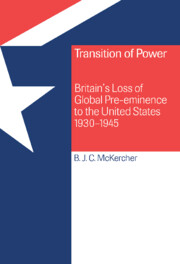Book contents
- Frontmatter
- Contents
- Acknowledgments
- List of abbreviations
- Prologue: Power and purpose in Anglo-American relations, 1919–1929
- 1 The end of Anglo-American naval rivalry, 1929–1930
- 2 The undermining of war debts and reparations, 1929–1932
- 3 Disarmament and security in Europe and the Far East, 1930–1932
- 4 The unravelling of co-operation, 1932–1933
- 5 Moving away from the United States, 1933–1934
- 6 Britain, the United States, and the global balance of power, 1934–1935
- 7 From Abyssinia to Brussels via London, Madrid, and Peking, 1935–1937
- 8 Appeasement, deterrence, and Anglo-American relations, 1938–1939
- 9 Belligerent Britain and the neutral United States, 1939–1941
- Epilogue: ‘A new order of things’, 1941–1945
- Select Bibliography
- Index
8 - Appeasement, deterrence, and Anglo-American relations, 1938–1939
Published online by Cambridge University Press: 15 July 2009
- Frontmatter
- Contents
- Acknowledgments
- List of abbreviations
- Prologue: Power and purpose in Anglo-American relations, 1919–1929
- 1 The end of Anglo-American naval rivalry, 1929–1930
- 2 The undermining of war debts and reparations, 1929–1932
- 3 Disarmament and security in Europe and the Far East, 1930–1932
- 4 The unravelling of co-operation, 1932–1933
- 5 Moving away from the United States, 1933–1934
- 6 Britain, the United States, and the global balance of power, 1934–1935
- 7 From Abyssinia to Brussels via London, Madrid, and Peking, 1935–1937
- 8 Appeasement, deterrence, and Anglo-American relations, 1938–1939
- 9 Belligerent Britain and the neutral United States, 1939–1941
- Epilogue: ‘A new order of things’, 1941–1945
- Select Bibliography
- Index
Summary
It is always best & safest to count on nothing from the Americans except words but at this moment they are nearer ‘doing something’ than I have ever known them and I cant [sic] altogether repress hopes.
Chamberlain, December 1937Chamberlain made this famous statement about Americans, their ‘words’, and international security during a flashpoint spawned by the fighting in China. On 12 December 1937, Japanese aircraft operating along the Yangtze River attacked a USN gunboat, the Panay, whilst Japanese shore batteries shelled two RN riverboats, the Ladybird and the Bee. In the case of the Panay, escorting American-owned tankers and evacuating American embassy staff, those swimming to safety were machine-gunned: three were killed and almost fifty were wounded. Roosevelt immediately demanded an apology and reparations. Although Tokyo claimed the attack was unintentional, Grew received formal regrets from Hirota, and the Japanese government agreed to pay $2 million in restitution. Roosevelt's initial reaction to the ‘Panay incident’ prompted Chamberlain's comment, a hope that Washington would finally use American strength to help show the totalitarian Powers that limits existed to their ambitions. However, when the British approached Washington about a joint reaction to the Japanese attack, they met refusal. Roosevelt did talk about an Anglo-American blockade in the event of a future Japanese indiscretion, but he phrased it in vague terms. Added to this, Congressional isolationists moved quickly to prevent the president from using armed force to defend American interests beyond the continental United States. On 14 December, Representative Louis Ludlow introduced a bill to ensure that, except in meeting an invasion, the United States could only go to war if American citizens agreed to do so in a national plebiscite.
- Type
- Chapter
- Information
- Transition of PowerBritain's Loss of Global Pre-eminence to the United States, 1930–1945, pp. 248 - 277Publisher: Cambridge University PressPrint publication year: 1999

